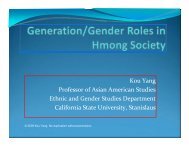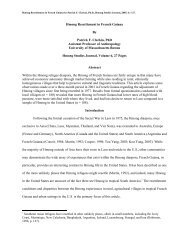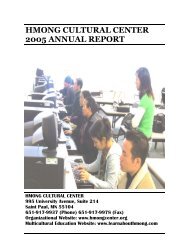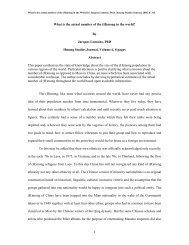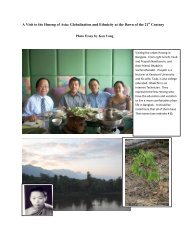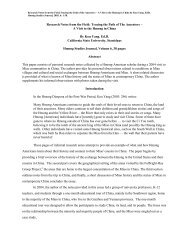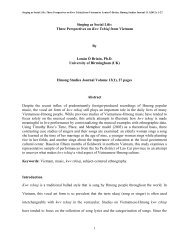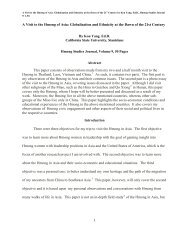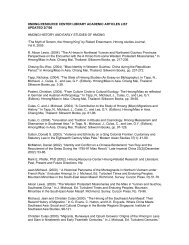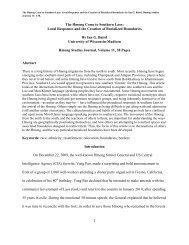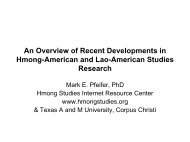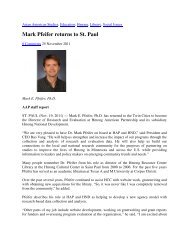Hmong and Lao Refugee Women - Hmong Studies Internet ...
Hmong and Lao Refugee Women - Hmong Studies Internet ...
Hmong and Lao Refugee Women - Hmong Studies Internet ...
You also want an ePaper? Increase the reach of your titles
YUMPU automatically turns print PDFs into web optimized ePapers that Google loves.
<strong>Hmong</strong> <strong>and</strong> <strong>Lao</strong> <strong>Refugee</strong> <strong>Women</strong>: Reflections of a <strong>Hmong</strong>-American Woman Anthropologist by Dia Cha, Ph.D. <strong>Hmong</strong> <strong>Studies</strong> Journal,<br />
2005, 6: 1-35.<br />
However, it should also be noted that the author had certain perceptions at variance with those of<br />
her fellow UNHCR <strong>and</strong> NGO representatives. Unlike many, the author was against forced repatriation.<br />
Having worked closely with refugees <strong>and</strong> having enjoyed considerable confidence with respect to their<br />
personal communications, it was the author's belief that, although not everything said was to be accepted,<br />
nonetheless there was a considerable <strong>and</strong> warranted fear for life <strong>and</strong> safety should repatriation to <strong>Lao</strong>s<br />
occur. Until this fear had been convincingly allayed, refugees, by <strong>and</strong> large, would not willingly return.<br />
Many representatives of UNHCR <strong>and</strong> NGOs, meanwhile, considered that refugees simply wished to<br />
remain in camp for personal reasons, so that these refugees actively manipulated unfounded concerns in<br />
furtherance of this desire.<br />
At variance, too, was the author's conviction that both refugee women <strong>and</strong> refugee men should be<br />
included as members of those groups searching for solutions to refugee problems. While research was<br />
being conducted for this project, NGO staff met once each month in Chieng Kham camp to discuss<br />
programs; no refugee was ever invited to participate in any of these discussions. Every year,<br />
representatives of UNHCR, together with officials of the <strong>Lao</strong> <strong>and</strong> Thai governments, held a tripartite<br />
meeting to seek solutions to refugee problems; no refugee leader was ever allowed to attend any of these<br />
meetings. <strong>Refugee</strong>s, indeed, were expected simply to accept what had been decided on their behalf, <strong>and</strong><br />
to issue no protest at what was allotted them. Any reluctance was ignored, despite a considerable, <strong>and</strong><br />
obvious, gap between what the refugees considered to be their problems <strong>and</strong> what camp authorities<br />
considered such problems to be.<br />
This variance in opinions should not be construed as a condemnation of camp authorities; far<br />
from it. One felt constrained, in fact, to feel great empathy for these authorities, who, with the best of<br />
intentions, worked so hard to find a "durable solution" to the seemingly intractable difficulties of the<br />
refugee conundrum. At the same time, however, it is easy to underst<strong>and</strong> why refugees often felt reluctant<br />
to accept their lot, or declined to do so. From the refugee perspective, it often seemed that camp<br />
authorities were excessively peremptory in the imposition of conditions <strong>and</strong> regulations. After all, so the<br />
refugee argument went, it was they, themselves, who had to live in the camps or live in <strong>Lao</strong>s, not the<br />
28



